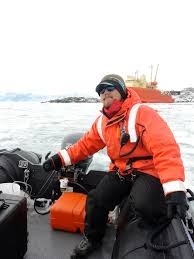Yuta Kawarasaki

Biology professor Yuta Kawarasaki works on insects. These days, he’s most likely to be found collecting goldenrod stems, looking for specimens of the goldenrod gall fly.
But his dissertation research--on which he is still active--focuses on the Antarctic midge, a tiny insect found on the Antarctic Peninsula, that long finger of land that extends north out of the continent.
Between 2009 and 2016, Yuta spent quite a bit of time in Antarctica, where he witnessed some dramatic instances of the fact that climate-related changes are happening on this continent faster than anywhere else in the world. Glaciers have retreated dozens of feet in those seven years. Penguin colonies have shrunk still more.
But what about those midges? They’re a different story. It seems that these tiny insects (that are, nevertheless, the largest wholly terrestrial animals native to Antarctica!) have a physiological flexibility that allows them to tolerate many of the changes that we’re experiencing. They are apparently among those organisms that seem capable of accommodating, and quickly. What might we learn from the midges? We’ll wait to hear more from Yuta.